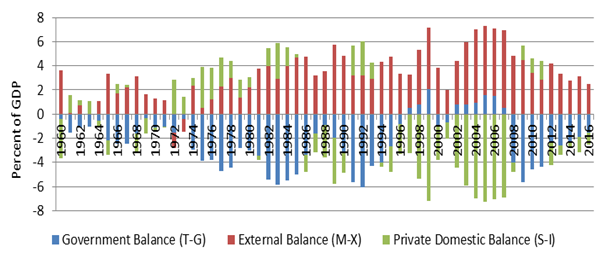Assignment:
Sectoral Balances (Textbook Reading ‘Sectoral Accounting and the flow of funds' Ch 5)
Word length and referencing instructions: each sub-question should be between 50 -60 words. For this assignment which is based on the Module and textbook and no other external sources, it is not essential to reference. Nevertheless, it is good academic practice to still reference the textbook if you referred to that.
Use this graph, based on ABS real GDP figures, to help you answer these questions.

During the Howard Government (1996 -2007) Australia had a trade deficit. For most of these years the government had a fiscal surplus.
a) Using the sectoral balances identity, explain the consequences of these surpluses for the private sector's net acquisition of financial assets.
0 ≡(S-I)+(T-G)+(M-X)
b) In the following period, 2008 - 2012, how did households respond to this change in net financial assets? What types of actions did they do? Refer to Private Domestic balances for 2009- 11 to give you a hint.
2.In the mainstream media, politicians from both major parties, business leaders and other commentators, are continually arguing that Australia needs to ‘repair its budget' and aim to achieve a fiscal balance or even surplus within the next decade. Various reasons for the imperative of this are given, such as fear of being downgraded by international credit ratings agencies, and ‘burdening future generations with debt'. Notwithstanding the economic validity of these fears, does this goal appear achievable? Why or why not? (Argue your case based on historical evidence and economic logic, not political bias.)
If a fiscal balance or surplus period was somehow achieved, what would be the likely consequences for the Private Domestic balance, assuming that Australia's external (trade) balance is unlikely to change from the general pattern of the past five decades?
3.If a household or firm borrows from a bank, briefly explain why this is considered a horizontal transaction?